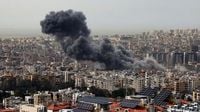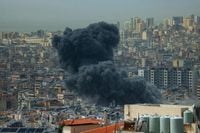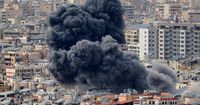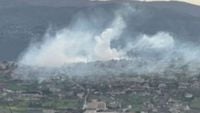In a dramatic escalation of tensions, Israel conducted air strikes on southern Beirut's suburbs on Friday, March 28, 2025, marking the first major bombardment since a ceasefire was brokered in November between Israel and Hezbollah. The strikes occurred shortly after the Israeli military issued an evacuation order for residents in the Hadath neighborhood, an area known for its dense population and proximity to Hezbollah facilities. This attack has reignited fears of a renewed conflict in the region, which had seen a fragile peace following a year-long war.
Lebanese President Joseph Aoun, while in Paris meeting with French President Emmanuel Macron, condemned the Israeli strikes as a blatant violation of the ceasefire. According to Aoun, the attacks represent a continuation of Israel's disregard for the agreements made to stabilize the region. "The framework agreed upon by Lebanon and Israel was not respected today by Israel unilaterally and without us having either information or proof of the triggering event," Macron stated, emphasizing the unacceptable nature of the strikes.
The Israeli military claimed that the air strikes targeted a drone storage facility belonging to Hezbollah, an Iran-backed armed group. This facility was reportedly involved in operations against Israel, and the military justified the strikes as necessary for national security. The Israeli Defense Minister, Israel Katz, asserted that the Lebanese government bore direct responsibility for the attacks launched from its territory, vowing that without peace in Galilee, there would be no peace in Beirut either.
The situation escalated earlier that morning when two rockets were fired from Lebanon towards northern Israel. One of the projectiles was intercepted, while the other fell short, landing within Lebanese territory. This incident marked the second such attack within a week, following a similar rocket fire on March 22, which had already strained the ceasefire. Hezbollah, however, denied any involvement in the recent rocket launches, with a senior official claiming that these actions appeared to be an attempt to create pretexts for continued Israeli aggression.
As panic gripped the Hadath neighborhood, residents rushed to evacuate, creating significant traffic congestion as they fled the area. Witnesses described scenes of chaos as people attempted to escape on foot and by vehicle following the Israeli evacuation order. The Israeli military had previously issued warnings, conducting smaller targeted drone strikes on the building before the larger bombardment, which resulted in a significant column of black smoke rising over the city.
Macron, during his meeting with Aoun, expressed his concern over the renewed violence, stating that the strikes and the failure to respect the ceasefire were unilateral actions that jeopardized the fragile peace. He pledged to contact U.S. President Donald Trump and Israeli Prime Minister Benjamin Netanyahu to discuss the situation and urged Lebanon's allies to act quickly to prevent further deterioration.
The ceasefire, mediated by the U.S. and France, mandated that Hezbollah withdraw its forces from southern Lebanon, allowing Lebanese troops to deploy in the area while requiring Israeli ground forces to retreat. However, the recent spate of rocket fire from Lebanon has raised questions about the viability of this agreement, with allegations from both sides of violations.
In a written statement, President Aoun called on the international community to intervene and ensure that Israel adheres to the ceasefire, highlighting the need for stability in Lebanon. The United Nations Special Coordinator for Lebanon, Jeanine Hennis-Plasschaert, also expressed concern, stating that any exchange of fire is one too many and warning that a return to wider conflict would be devastating for civilians on both sides.
The Israeli military's actions on Friday reflect a broader strategy to maintain security in the region, particularly as tensions remain high following the recent conflicts involving Hezbollah and the ongoing situation in Gaza. The Israeli government has reiterated its commitment to protecting its citizens, particularly those living in border areas, and has vowed to respond decisively to any threats.
As the situation unfolds, the international community watches closely, with leaders in both Israel and Lebanon facing pressure to de-escalate tensions. The fragile truce established last November now hangs in the balance, with both sides accusing each other of violations and failing to uphold their commitments. The potential for renewed conflict looms large, as the region grapples with the ramifications of these latest developments.
In summary, the events of March 28, 2025, underscore the precarious nature of peace in the region, with both Israel and Hezbollah navigating a complex landscape of military engagements, political pressures, and international diplomacy. As leaders seek to stabilize the situation, the hope for a lasting peace remains uncertain amid the backdrop of ongoing violence and mutual distrust.







